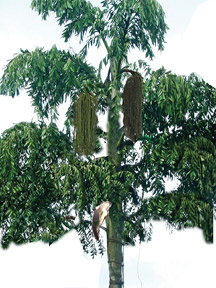Stable market to boost Kithul industry vital
By Ananda Kannangara
|

Additional Secretary, Ministry of Traditional Industries and
Small Enterprise Development, K.R. Samarasinghe
|
Although Sri Lanka is blessed with different species of plants such
as coconut, palmyra, arecanut, breadfruit , jak, tea and rubber, the
Kithul palm which is another important tree of which people do not talk
much, has a history of over 500 years.
Kithul is known as the Toddy Palm by Sri Lankans during the colonial
period, since the sap taken from tapped Kithul flowers is used to
produce a herbal drink called Ra in Sinhala and Toddy in English.
An Englishman who had a great liking to Kithul toddy, called it the
‘Fish-Tail Palm’. He used this word after a careful study of the kithul
leaf which is similar to the tail of a fish. The botanical name for the
kithul palm is Caryota urens, and Koondalpanai in Tamil.
Kithul is found in wet zones. Kithul is a dual purpose palm. The sap,
is used to produce treacle, jaggery, toddy and herbal beverages. Treacle
and jaggery are used to make traditional sweetmeats such as Kavum,
munguli, aggala, wanduappa.
Kithul flour is used to make Vali thalapa and kithul talapa.
The timber, of matured kithul trees is used to manufacture cupboards,
tables, chairs, doors, lamp shades, kitchen utensils and ornamental
handicraft for the local and the export market.
Even before the advent of the Portuguese and the British some Sri
Lankan rulers - Dutugemunu, Kawantissa and Sri Wickrama Rajasinghe had a
great liking for food, made of kithul treacle and flour. Some villagers
used to offer various kinds of traditional food items made from kithul
flour to the palace.
King Sri Wickrama Rajasinghe is recorded to have a habit of drinking
processed sweet toddy (currently called arrack) made out of kithul sap.
According to the Ministry of Traditional Industries and Small
Enterprise Development, kithul is cultivated in 18 districts in the
country, mostly in Gampaha, Kalutara and Kandy.
Over three million kithul palms are found in these districts and of
them 600,000 are matured palms. Around 90,000 are tapped for toddy,
treacle and jaggery.
Nearly 30,000 Sri Lankans are currently employed in the kithul
industry and over 50,000 families depend on its income.
|

A Kithul tree |
The Sunday Observer had a rare opportunity of visiting kithul
plantations in the Kalutara District. The Kalutara district has over
15,000 kithul palms. Kithul is one of the major employment generating
industries providing jobs for 7,000 families in the district.
K.L. David, a 67-year old farmer of Palathota said he has been in the
kithul industry for the past 35 years and called upon the Government to
set up a market to sell their products.
He said kithul producers face financial problems and occupational
hazards. He said that an insurance scheme is essential for tappers.
A kithul toddy producer, Piyananda of Ratnapura said authorities
should look in to the welfare of tappers and their families by offering
bank, distress and housing loans and medical benefits.
He urged the authorities to implement a pension scheme for tree
tappers.
Additional Secretary, Ministry of Traditional Industries and Small
Enterprise Development, K.R. Samarasinghe said steps have been taken to
develop the kithul industry while protecting existing trees. “We will
implement safety measures and introduce medical benefits for tappers,”
he said.
According to Excise Ordinance, kithul trees cannot be tapped without
a licence and urged Police to allow persons involved in the industry to
carry out their tree tapping freely.
He said steps have been taken to produce chocolates and jujubes from
Kithul treacle.
Around 2,000 kithul tree tappers will be trained during next year.
Samarasinghe said: ‘KASPER’ (Kithul Activation and Sap Production
Enhancing Reagent ), is a new technology , introduced by the Technology
and Research Ministry with the Industrial Technology Institute (ITI) to
increase the yield.
He said Kithul sap could be stored for three to four days without
adding chemicals. He said although KASPER technology is used by kithul
palm owners to increase production, some villagers use herbal medicines
to enhance production.
Gamalath Peris of Ratnapura said he has ten Kithul palms and has not
used the KASPER technology.
He said the traditional herbal medicine, prepared by him using
leaves, garlic and other raw material is ideal to increase production. |

